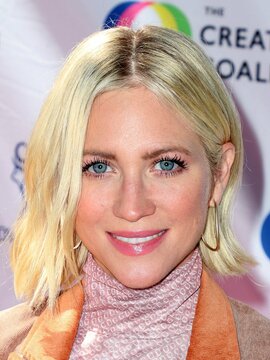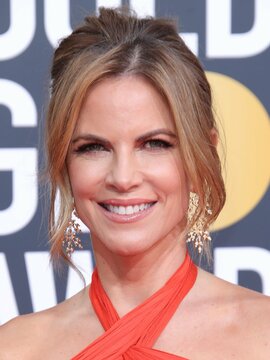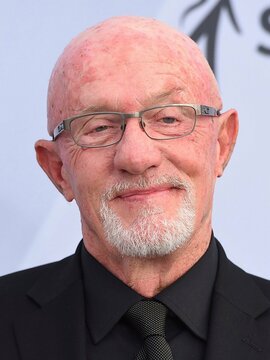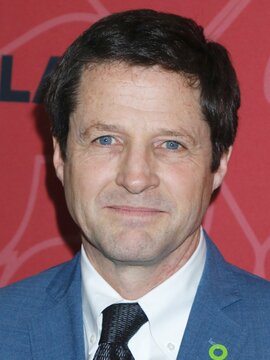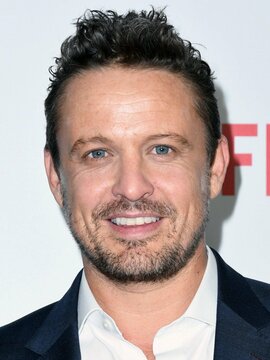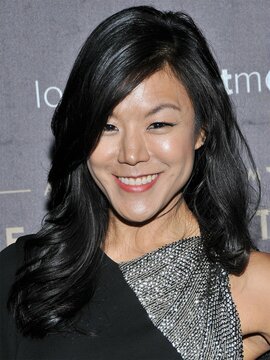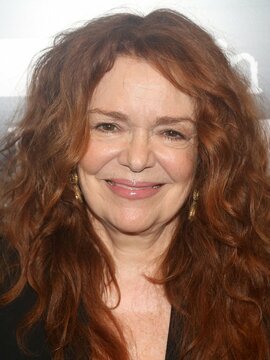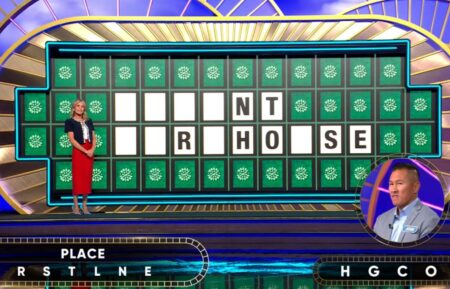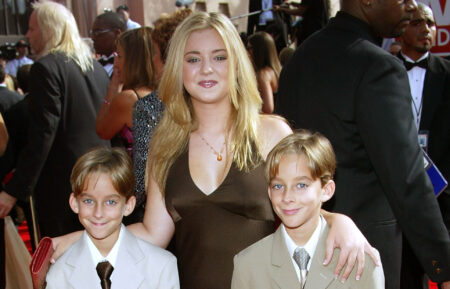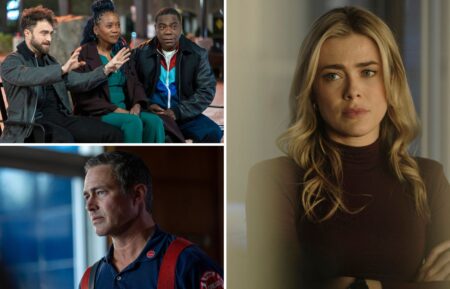‘The Beast in Me’ Boss Breaks Down Season 1 Ending: ‘Nobody Gets Away Scot-Free’
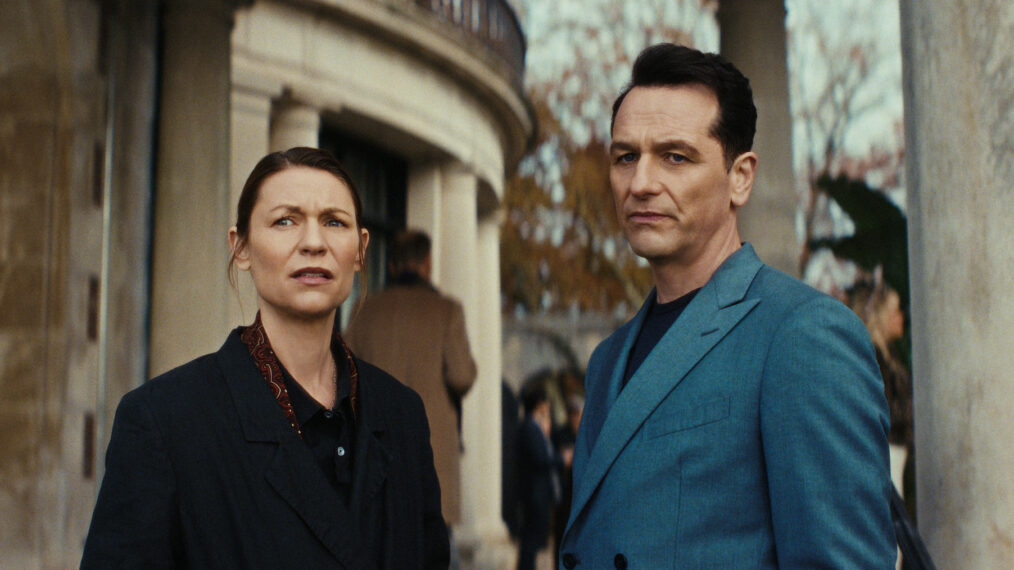
Spoiler Alert
What To Know
- The Netflix series The Beast in Me explores themes of complicity, denial, and the persistence of evil, with characters confronting their own roles in a web of coverups and violence.
- Executive producer Howard Gordon explains the finale ending and shares if there were any others considered.
- Gordon also breaks down key moments throughout the season between Claire Danes and Matthew Rhys’ characters.
[Warning: The below contains MAJOR spoilers for The Beast in Me.]
“My hands are far from clean,” author Aggie (Claire Danes) writes in her book after the events of The Beast in Me. Such is the case for many of the characters of this thrilling new Netflix series.
Aggie’s still grieving the loss of her and Shelley’s (Natalie Morales) son, in a car accident she blames Teddy Fenig for — she’d been distracted doing an interview over the phone at the same time as Cooper was playing in the backseat — when Nile (Matthew Rhys) and his new wife Nina (Brittany Snow) move in next door. The world thinks Nile killed his first wife, and, as the all-flashback Episode 7 shows, he did, brutally. He also frames Aggie for Teddy’s death, putting his body in her son’s room. But it’s Nina who’s his ultimate downfall, having recorded his murder confession. Then, Nile’s uncle, Rick (Tim Guinee), has him killed in prison.
Below, executive producer Howard Gordon breaks down that finale ending.
Why have it be Nina who is ultimately Nile’s downfall to his face and Aggie kind of off to the side?
Howard Gordon: I describe the end like landing planes at JFK on a snowy Christmas Eve. There were so many planes to land. It’s a question that can’t be answered just because it was like that’s where Aggie, who we thought at that moment was going to be just caught in the mouse trap — it just synced that way. We were like rhythmically, this is really this two-hander and we are missing it. And really only when we figured out the coda at the end did we say, OK, this is what works. And the truth is, when you look at it like, everybody slowly realizes what their complicity has been in this ongoing coverup that has been fueled by denial, privilege, everybody kind of saw what they wanted to or covered up and thought they had kept the evil at bay. But the resilience and the persistence of that kind of sociopathy is nobody gets away scot-free.
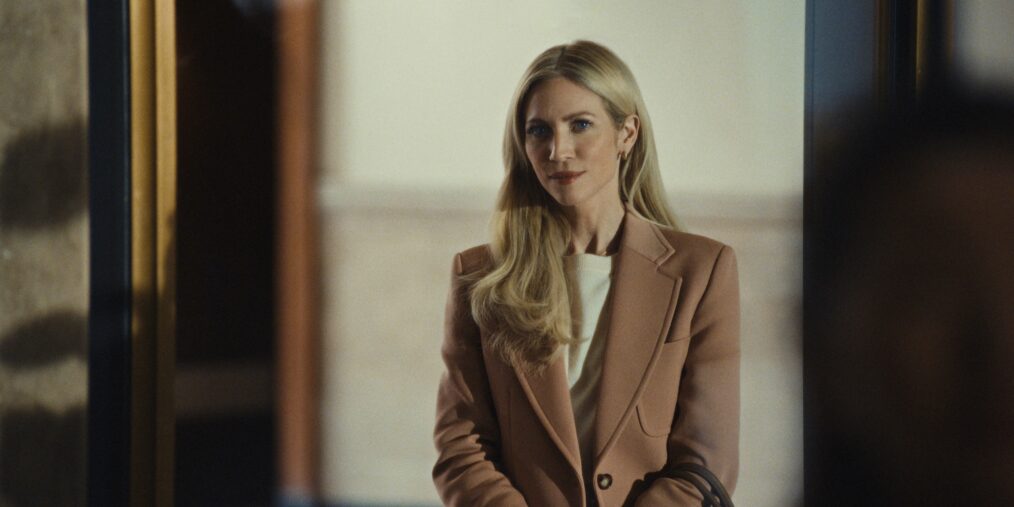
Courtesy of Netflix
Nina, what I really liked and hoped helped set us up for the fun reversals that these shows require narratively was her capitulation to her husband, even when she finally looks at it squarely, she’s a mother, here’s the consequence. And that was kind of based a little on a Stephen King story [A Good Marriage], not to go too deep in the weeds, where a woman realizes her husband and the father of her two now adult children is a serial killer, a long dormant serial killer. She had this calculus where she’s going to call the police and then she realized, oh my God, if I call the police, my entire family, my life, my daughter’s life is ruined. And so that gave me the confidence to go, I could really see Nina, who kind of was only looking at the situation with one eye anyway, when she finally recognizes that the father of her — not only her husband, but the father of her child is this monster, why she might just capitulate or finally go along with it. So that was a reversal that we needed to tee up our fun reversal. But at the same time, that’s where the reckoning was, and then the effect that Aggie is kind of there to sort of get the assist or we realize, oh my God, she’s in on it with Nina. So it was a bit of revenge of the women who have been abused.
When Aggie visits Nile in prison? Such a good scene. How worried is she that Nile might be right, that they are the same? Because being complicit, feeling the pull and her own blood lust as she says in her book, that’s one thing, but being like Nile is completely different from that.
Well, 100%. The real question, and I’ll have to leave it to the audience and to you to sort of decide whether she recognizes, Aggie, the complicity in her having wound up this — by telling a monster or presumed monster, her deepest id, her wish that Teddy Fenig paid the price that he did. It really is about a squaring with herself, a narrative that she’s told herself and the price of that, which she again says in her own book, confessionally, I’ll have to live with the fact that I have now been part of taking a son from another mother.
It goes back to a very deep philosophical question about, what is evil? Is evil doing evil or is it turning away from evil? Is it looking away? Is it complicity? And I think that that’s a real thing that is not — no, they’re not the same and she’s not a killer. But if I whisper to — remember that episode, not to keep on citing other shows, but remember when Dr. Melfi in The Sopranos, she’s been raped and we’re waiting for her to tell Tony that, but she doesn’t, which, David Chase is such a master at subverting expectations. But in this case, I think, yeah, Aggie has to live with that and I hope she feels — She’ll never not be the same.
Had you known from the start that Nile wouldn’t survive the season?
Well, the short answer is yes, then no, then yes again, and yes, in that we had some notion roughly speaking, the flags were planted, how are we going to get there? But I really knew I wanted to create a situation where she was in a bit of that mouse trap. And then I woke up once and I came into the writers’ room at the time, I was convinced, maybe let’s just go all in and this is how life is. I don’t know what cynical event and current events made me think that. But yeah, I think the audience would’ve been throwing their shoes at the TV or whatever they watch it on.
Are there any alternate endings you considered?
I think that the good part of an ending is that you feel like — yes, this went through many, many iterations. Like I said, landing all those planes is — just things that maybe we thought, maybe Nile doesn’t have to die. And just being in prison, is that worse than actually the mercy of being killed? But everything felt just right. And I guess ultimately looking back at it, I really couldn’t be happier with the way [it ended]. I wish I had one upgrade on the old trope of the recording because that was like a placeholder, but we never found anything that could make it to beat that.
Why have Episode 7 be the flashback one that reveals all about what happened to Madison? And then also how important was it for you to show that happy ending with Aggie and Shelley and Cooper in that?
Part of the problem was that when we got the green light, we had a window [to film] and Claire had committed to another project. And so we actually needed to find a way to flip the episode. We wound up not doing it, but we had that in our back pocket that if we didn’t hit all our things, we needed to open up Claire’s schedule and we could have shot [Episode] 8 in front of 7. But it turned out that it was creatively something that the story really required because part of this challenge has been prosecuting two simultaneous mysteries, one in the past, one in the present, and all those come together and it had everything to do with illuminating Jonathan Banks‘ story and the uncle and Tim Guinee’s story. And then at the end when Claire was available, to be perfectly honest with you, I said, she’s got to be in this. And I said, what was she doing around this time then? Oh, let’s put a nice little coda when things were happy.
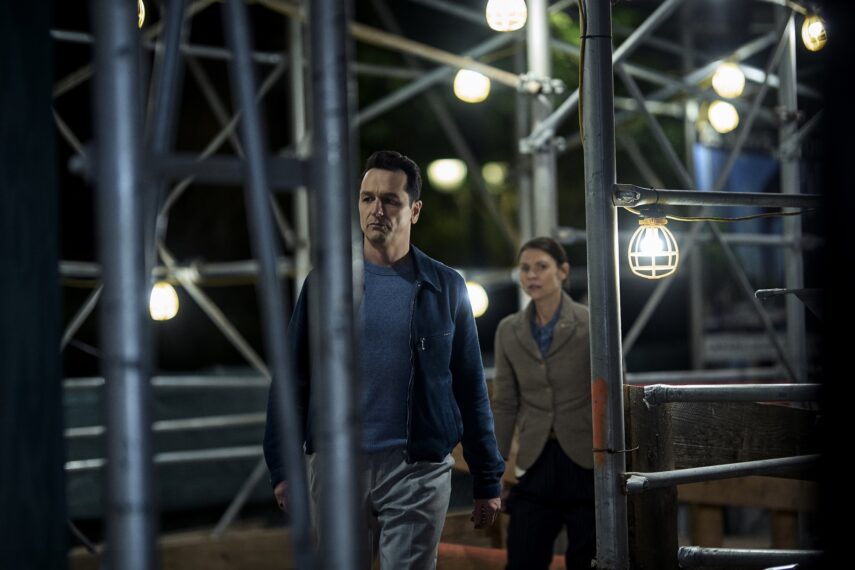
Chris Saunders/Netflix
Could Nile have pushed Aggie off the ledge when he takes her up at Jarvis Yards in Episode 3? Or is he too intrigued by her at that point to truly consider doing so?
I think it would’ve pained him to do it. I think he’s a bully. And so I think the intimidation of the moment was really just a way to get her to get as close to the truth or what he in the moment felt was a betrayal. But it turns out, yeah, he could have. I love the way Claire plays [after] in the car with Abbott. That was just great. I really think you feel the emotion of that release, so the scene is really part of a sequence that I think works nicely.
Episode 5 really stands out for the Aggie and Nile scenes. Why did you want to have that at that point in the season? And what did you want to do that whole sequence? The two of them together are just fantastic on screen.
Unbelievable. This is one of the great treats, and you never know how it’s going to turn out. But in this case, Daniel Pearle — both he and I came onto the show after the show had been developed for a bit, and we knew that at some point in the season, we wanted her to feel like, oh my God, I was wrong. Shelley was right. I am projecting this story. And in that moment, because again, the perverse fun or subversive part of the show, it’s perverse, but it’s subversive, is that these two very lonely people find each other, and so showing that kind of moment was — Daniel, who is a playwright and who’s not afraid to write a long scene, wrote a brilliant scene when they have that lunch in the pilot by the seaside. But it’s a scene that really that’s not afraid of language and it’s the proverbial cat and mouse and these two actors are operatically excellent at squeezing every gesture, so, it was just a beautiful synthesis between that, and also our director, Lila Neugebauer, was terrific. It was very theater.
Yeah, I was going to say, in different circumstances, if Nile wasn’t a killer, that sequence made me think these two could maybe be friends.
Even when they get into like, Hey, aren’t you a little tempted? And she’s like, oh. It really goes into fun stuff that you could really look at it, if it wasn’t done, I think, well, one could say, oh, that’s offensive, or that’s this. But I think that’s the nature of their relationship. And I do like the fact that because she’s gay, it kind of does take off the table what I think could have been an encumbrance to their relationship. I think asexual sexuality or asexual sensuality is kind of what is the secret ingredient of that relationship.
Yeah, I was wondering about the vibe between Aggie and Nina a little bit at times.
Yeah, well, I’m so happy, Meredith, that you did because that is what was intended.
The moment in the woods, with the sprained ankle…
I love it. I’m so happy you saw it, you felt it because what the intention was.
Watching the dawning realization come over Nile’s father, then he collapses, and then we see Rick continuing to protect his brother throughout to the point of what he does before he is arrested… Why was he so adamant to do that for his brother and protect him so hard?
I’ve worked with Tim Guinee on every show I’ve done. He did my first show that I created called Strange World, he was the star. I’ve worked with Tim now for 30 years, and he’s very much an actor’s actor. And in fact, I’m ashamed to say he didn’t cross my mind for the part, but he actually read, and then when I saw him read, he had also played in The Staircase for Antonio [Campos]. So we both were like, oh my God, what were we thinking? We know Tim, and we hadn’t thought of him. So he’s such, first of all, an amazing actor and an amazing person, and the difference between he and Jonathan too — Circumstances make you come up with a story. And so the idea of Jonathan being a good chunk older than Tim, so he was a much older brother, they were kind of Dickensian orphans, that loyalty…
Like you said, Aggie isn’t Nile. Uncle Rick isn’t him either. But they all have something broken, something is in them. And I think he recognizes his nephew and certainly doesn’t like him and doesn’t like what he’s done to his brother. And so I think it was very simple in that, oh, my older brother did everything to keep me out of trouble. Now, whatever, I don’t drink. I’m in program, I take care of the dogs and live over the garage. And he says something to Nina at one point when she goes, don’t you want [more], you’re the brother and you’re living there? And he goes, I have something my nephew and my brother will never have. And she goes, what’s that? And he means her, too. And he says, enough.
That was a line, by the way, a real line that I remember having heard between Joseph Heller and Kurt Vonnegut at some really ritzy Hamptons party. And one of them was saying to the other, look at that guy, he’s a banker. He is worth [this since he just] just sold his company for this. He goes to over all these people, do you know how many books would take to have that? And I don’t know whether it was Vonnegut or Joseph Heller who said that to the other, but he goes, I have something none of them will ever have. So short answer is his loyalty, which I think we set up in Episode 3, shows the deep love and debt that that younger brother has for his older brother who has tried to wish away, cover up, deny that the evil he recognizes is always there with that nephew, with his son.
How worried is Nina for her baby at the end there because the way she looks at a baby and looks at Aggie’s book on the floor… How worried is she about following in the father’s footsteps?
The look on her face. I think Aggie is narrating her deepest fear. And what the show is obviously about is the persistence and metastases of evil and its resilience across generation. So I would say it’s a little Omen-y, but it’s been fun to mix and match tones on the show.
The Beast in Me, Streaming Now, Netflix





